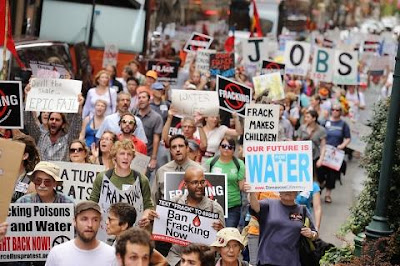A new study finds no evidence that the controversial practice to extract natural gas known as hydraulic fracturing is contaminating ground water.
The report, "Separating Fact from Fiction in Shale Gas Development," published by the University of Texas Energy Institute, attempts to allay fears that fracking poses a threat to public health and the environment.
According to Charles Groat, associate director of the institute, fracking, which injects water and chemicals into a well at high pressure to shatter the gas-bearing rock deep underground, is not to blame for polluted wells.
“However, that doesn’t mean that there aren’t other parts of the
process of shale gas development that could get things you don’t want in
shallow ground water or surface water,” Groat says.
The rush to develop new domestic sources of energy in the United States has led to a surge in drilling across the country in more than 30 states.
The rush to develop new domestic sources of energy in the United States has led to a surge in drilling across the country in more than 30 states.
The northeastern state of Pennsylvania is issuing 2,500 permits a
year to drill the Marcellus Shale, estimated to be the largest
underground reservoir of natural gas in the United States.
While the stepped-up gas extraction promises to boost employment and
stimulate the economy, activists who oppose the practice for
environmental and health concerns, are working to ban it.
The oil and gas industry insists that fracking is both efficient and safe.
The analysis of major gas drilling operations in Pennsylvania, Texas and Louisiana finds that many reports of groundwater problems can be traced to surface chemical spills, leaky open air ponds or mishandling of wastewater and not fracking.
read more@voanews.com

No comments:
Post a Comment